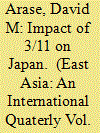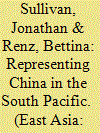|
|
|
Sort Order |
|
|
|
Items / Page
|
|
|
|
|
|
|
| Srl | Item |
| 1 |
ID:
117641


|
|
|
|
|
| Publication |
2012.
|
| Summary/Abstract |
China, as host of the six-party talks first convened in August 2003, has
been one of the major players in dealing with the North Korean nuclear crisis that
began in October 2002. China's role in the talks has helped to start shaping a stable
regional security architecture in Northeast Asia. Beijing's leadership in building a
new security regime in the region suggests a change on Chinese perspectives regarding its role within the broader East Asia's regional security architecture. After years of
passiveness with regards to involvement in security regime building in the region,
China has evolved into an active leader seeking to shape a more institutionalized
security. Despite the obstacles to building a functioning regime in Northeast Asia,
China seems poised to continue working towards creation of a more stable and
institutionalized security architecture.
|
|
|
|
|
|
|
|
|
|
|
|
|
|
|
|
| 2 |
ID:
117640


|
|
|
|
|
| Publication |
2012.
|
| Summary/Abstract |
The question posed in this paper is whether the triple disaster of 3/11 constitutes a "critical juncture" in Japan. We can point to minor discontinuities in Japanese policies, institutions, and identity caused by the earthquake, tsunami, and nuclear plant meltdown that eventuated on March 11, 2011, but in the year following the event there was no evidence of a critical change. The disaster and post-disaster situation in Japan are summarized, and an explanation for the lack of critical change in nuclear policy-an area where change might have been expected in view of the fact that European countries reacted to 3/11 with critical changes in nuclear energy policy-is sought by comparing the ability of mainstream theories of Japanese politics to explain the situation.
|
|
|
|
|
|
|
|
|
|
|
|
|
|
|
|
| 3 |
ID:
117643


|
|
|
|
|
| Publication |
2012.
|
| Summary/Abstract |
Chinese diplomacy, aid, economic interactions and manifestations of soft
power have increased the country's influence in the South Pacific region. By some
accounts, China's influence is already approaching that of traditional stakeholders
Australia and New Zealand. In Africa and other regions state-led and private activities
in established powers' perceived spheres of influence has caused concern and
inspired particular narratives about China's motivations. In this article we examine
how media discourses in Australia and New Zealand have represented China's role in
the South Pacific. We find that China's role has been constructed using multiple
negative frames, which seek to establish China as unequivocally 'different'. More
than being unencumbered by the constraints of public opinion and a free press, China
is portrayed as operating in a different moral universe, in which the cold hearted
exploitation of vulnerable island nations (often in cahoots with venal island elites) is
entirely normal. The article shows how such constructions reveal some of the
complex issues involved in Australia and New Zealand's relationships both with
China and other South Pacific nations.
|
|
|
|
|
|
|
|
|
|
|
|
|
|
|
|
| 4 |
ID:
117642


|
|
|
|
|
| Publication |
2012.
|
| Summary/Abstract |
In Vietnam, Taiwanese (In this article, 'Taiwanese' refer to all the citizens in
Taiwan, although Taiwanese may not be a perfect usage for all the inhabitants in
Taiwan. For example, some 400,000 natives of JinMen County live and work in
Taiwan Province who might not identify with Taiwan Province. Also, many Vietnamese women in the ROC marry 'Taiwanese.' Perhaps it will take a few decades, if
not longer, for all the inhabitants in Taiwan to identify with "Taiwanese.") businesses
have led the Taipei government in the movement to 'Go South.' They have served as
pioneers, surrogates and middlemen for Taiwan's economic diplomacy in Vietnam.
Vietnam's 'Doi Moi' (Open Door) policy, inaugurated in December 1986, encouraged
greater openness to economic investment from abroad. Compared with China, Vietnam enjoys the privilege of better access to the European market. Vietnam has
become the only country in Southeast Asia that can parallel China in terms of trade
and investment at the turn of the century.
|
|
|
|
|
|
|
|
|
|
|
|
|
|
|
|
|
|
|
|
|